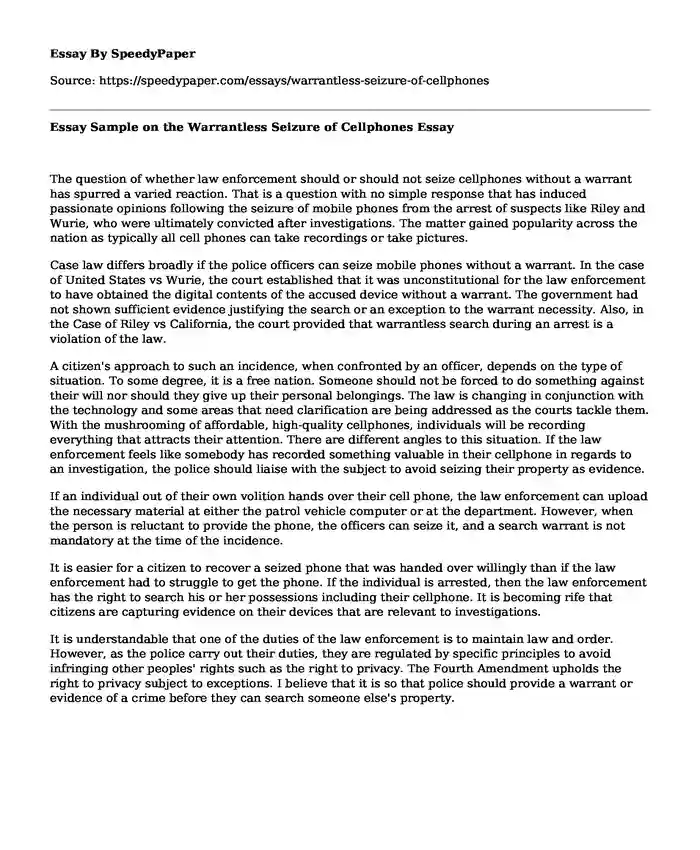The question of whether law enforcement should or should not seize cellphones without a warrant has spurred a varied reaction. That is a question with no simple response that has induced passionate opinions following the seizure of mobile phones from the arrest of suspects like Riley and Wurie, who were ultimately convicted after investigations. The matter gained popularity across the nation as typically all cell phones can take recordings or take pictures.
Case law differs broadly if the police officers can seize mobile phones without a warrant. In the case of United States vs Wurie, the court established that it was unconstitutional for the law enforcement to have obtained the digital contents of the accused device without a warrant. The government had not shown sufficient evidence justifying the search or an exception to the warrant necessity. Also, in the Case of Riley vs California, the court provided that warrantless search during an arrest is a violation of the law.
A citizen's approach to such an incidence, when confronted by an officer, depends on the type of situation. To some degree, it is a free nation. Someone should not be forced to do something against their will nor should they give up their personal belongings. The law is changing in conjunction with the technology and some areas that need clarification are being addressed as the courts tackle them. With the mushrooming of affordable, high-quality cellphones, individuals will be recording everything that attracts their attention. There are different angles to this situation. If the law enforcement feels like somebody has recorded something valuable in their cellphone in regards to an investigation, the police should liaise with the subject to avoid seizing their property as evidence.
If an individual out of their own volition hands over their cell phone, the law enforcement can upload the necessary material at either the patrol vehicle computer or at the department. However, when the person is reluctant to provide the phone, the officers can seize it, and a search warrant is not mandatory at the time of the incidence.
It is easier for a citizen to recover a seized phone that was handed over willingly than if the law enforcement had to struggle to get the phone. If the individual is arrested, then the law enforcement has the right to search his or her possessions including their cellphone. It is becoming rife that citizens are capturing evidence on their devices that are relevant to investigations.
It is understandable that one of the duties of the law enforcement is to maintain law and order. However, as the police carry out their duties, they are regulated by specific principles to avoid infringing other peoples' rights such as the right to privacy. The Fourth Amendment upholds the right to privacy subject to exceptions. I believe that it is so that police should provide a warrant or evidence of a crime before they can search someone else's property.
Cite this page
Essay Sample on the Warrantless Seizure of Cellphones. (2022, May 20). Retrieved from https://speedypaper.com/essays/warrantless-seizure-of-cellphones
Request Removal
If you are the original author of this essay and no longer wish to have it published on the SpeedyPaper website, please click below to request its removal:
- Saudi Arabia's Muslim Food: Essay Sample
- Free Essay - Criminal Punishment for Adolescent Cyberbullying
- Free Essay Example on Gangs
- Political Effects and Significance of Reichstag Fire. Free Essay Sample.
- Free Essay Sample on Anabolic Steroids and Substance Dependence
- Free Essay Comparing and Contrasting Different Methods of Job Analysis
- For the idea to be validated, proper research which agrees with scientific reasoning should be conducted. Exercise has an effective role in the development of lungs. As people exercise, breathing process increases. At times, there is deep inhaling and exhaling. This is done to compensate for oxygen debt.
Popular categories





